| Listing 1 - 10 of 14 | << page >> |
Sort by
|
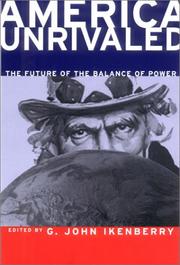
ISBN: 0801488028 Year: 2002 Volume: *15 Publisher: Ithaca London Cornell University Press
Abstract | Keywords | Export | Availability | Bookmark
 Loading...
Loading...Choose an application
- Reference Manager
- EndNote
- RefWorks (Direct export to RefWorks)
Balance des pouvoirs --- Balance of power --- Machtsevenwicht --- Power [Balance of ] --- Power politics --- Puissances [Équilibre des ] --- Équilibre des pouvoirs --- Équilibre des puissances --- Équilibre international --- Balance of power. --- National security --- United States --- Foreign relations --- 2001-2009
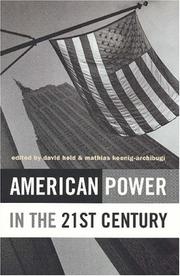
ISBN: 0745633471 Year: 2004 Publisher: Cambridge ; Malden Polity Press
Abstract | Keywords | Export | Availability | Bookmark
 Loading...
Loading...Choose an application
- Reference Manager
- EndNote
- RefWorks (Direct export to RefWorks)
Balance des pouvoirs --- Balance of power --- Machtsevenwicht --- Power [Balance of ] --- Power politics --- Puissances [Équilibre des ] --- Équilibre des pouvoirs --- Équilibre des puissances --- Équilibre international --- Hegemony --- World politics --- 1995-2005 --- United States --- Foreign relations --- 2001-2009

ISBN: 0801432014 080148295X Year: 1999 Volume: *11 Publisher: Ithaca, NY London Cornell University Press
Abstract | Keywords | Export | Availability | Bookmark
 Loading...
Loading...Choose an application
- Reference Manager
- EndNote
- RefWorks (Direct export to RefWorks)
International relations. Foreign policy --- Polemology --- Balance des pouvoirs --- Balance of power --- Guerre --- Machtsevenwicht --- Oorlog --- Polemologie --- Polémologie --- Power [Balance of ] --- Power politics --- Puissances [Équilibre des ] --- War --- Équilibre des pouvoirs --- Équilibre des puissances --- Équilibre international --- International relations --- Equilibre des puissances --- Relations internationales --- Case studies --- Cas, Etudes de --- Balance of power. --- War. --- Case studies.
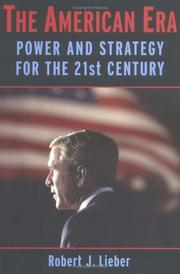
ISBN: 0521857376 0521697387 1107166616 9786611113063 0511337949 0511568703 0511755929 1281113069 0511338503 0511336764 0511337418 9780521857376 9780511338502 9780511252976 0511252978 9780511337413 9780511755927 9781107166615 9781281113061 6611113061 9780511337949 9780511336768 9780511568701 9780521697385 Year: 2005 Publisher: Cambridge : Cambridge University Press,
Abstract | Keywords | Export | Availability | Bookmark
 Loading...
Loading...Choose an application
- Reference Manager
- EndNote
- RefWorks (Direct export to RefWorks)
The American Era makes a provocative argument about America's world role. It sets out the case for a grand strategy that recognizes American preponderance as necessary and desirable for coping with the perils of the post-9/11 world. The book argues firstly that, Militant Islamic terrorism and weapons of mass destruction pose a threat which requires us to alter the way we think about the pre-emptive and preventive use of force. Secondly, the UN and other international bodies are incapable of acting on these urgent problems. Thirdly, in an international system with no true central authority other countries will inevitably look for leadership to the US. The book argues that if America does not respond actively to terrorist threats, no one else will take the initiative.
Balance des pouvoirs --- Balance of power --- Machtsevenwicht --- Power [Balance of ] --- Power politics --- Puissances [Équilibre des ] --- Équilibre des pouvoirs --- Équilibre des puissances --- Équilibre international --- United States --- Foreign relations --- 21st century --- World politics --- Social Sciences --- Political Science --- Balance of power. --- Power, Balance of --- International relations --- Political realism
Book
ISBN: 9781452241500 1452241503 Year: 2014 Publisher: Los Angeles : Sage Publications,
Abstract | Keywords | Export | Availability | Bookmark
 Loading...
Loading...Choose an application
- Reference Manager
- EndNote
- RefWorks (Direct export to RefWorks)
Balance des pouvoirs --- Balance of power --- Machtsevenwicht --- Power [Balance of ] --- Power politics --- Puissances [Équilibre des ] --- Équilibre des pouvoirs --- Équilibre des puissances --- Équilibre international --- United States --- Foreign relations --- Decision making --- Diplomatie --- États --- États-Unis --- Relations extérieures --- 21st century --- Diplomatie. --- Relations extérieures. --- United States - Foreign relations --- United States - Foreign relations - 21st century --- United States - Foreign relations - Decision making --- Relations extérieures --- États
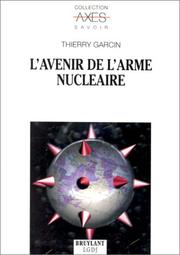
ISBN: 2802706160 2275002413 9782802706168 Year: 1995 Volume: 15 Publisher: Bruxelles : Emile Bruylant,
Abstract | Keywords | Export | Availability | Bookmark
 Loading...
Loading...Choose an application
- Reference Manager
- EndNote
- RefWorks (Direct export to RefWorks)
Alliances --- Alliances (Politique) --- Allianties --- Atoomoorlog --- Balance des pouvoirs --- Balance of power --- Désarmement nucléaire --- Guerre atomique --- Guerre nucléaire --- Kernoorlog --- Machtsevenwicht --- Nucleaire ontwapening --- Nucleaire oorlog --- Nuclear disarmament --- Nuclear warfare --- Power [Balance of ] --- Power politics --- Puissances [Équilibre des ] --- Équilibre des pouvoirs --- Équilibre des puissances --- Équilibre international --- Forecasting --- Nuclear weapons. --- Atomic weapons --- Fusion weapons --- Thermonuclear weapons --- Weapons of mass destruction --- No first use (Nuclear strategy) --- Nuclear arms control --- Future research --- Future studies --- Futures research --- Futures studies --- Study and teaching. --- Monograph
Book
ISBN: 2100023667 2100023657 9782100023660 Year: 1994 Volume: *3 Publisher: Paris : Dunod,
Abstract | Keywords | Export | Availability | Bookmark
 Loading...
Loading...Choose an application
- Reference Manager
- EndNote
- RefWorks (Direct export to RefWorks)
Balance des pouvoirs --- Balance of power --- Coexistence --- Coëxistence pacifique --- Foreign affairs --- Foreign policy --- Interdependence of nations --- International relations --- Internationale betrekkingen --- Machtsevenwicht --- Ordre mondial --- Peaceful coexistence --- Power [Balance of ] --- Power politics --- Puissances [Équilibre des ] --- Relations internationales --- Vreedzame coëxistentie --- Wereldorde --- World order --- Équilibre des pouvoirs --- Équilibre des puissances --- Équilibre international --- World politics --- Great powers --- Geopolitics --- Politique mondiale --- Grandes puissances --- Géopolitique --- Equilibre des puissances --- Great powers. --- relations economiques internationales --- relations est ouest --- relations nord sud --- international --- internationale economische betrekkingen --- oost westverhoudingen --- noord zuidverhoudingen --- internationaal --- Géopolitique --- Powers, Great --- Super powers --- Superpowers --- World politics - 1989 --- -Great powers. --- Géopolitique. --- Équilibre des puissances. --- Relations internationales. --- Géopolitique. --- Équilibre des puissances.
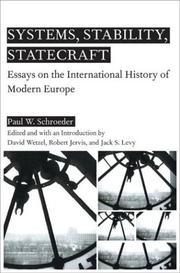
ISBN: 1403963576 1403963584 Year: 2004
Abstract | Keywords | Export | Availability | Bookmark
 Loading...
Loading...Choose an application
- Reference Manager
- EndNote
- RefWorks (Direct export to RefWorks)
Few scholars have provided as much insight into the struggle of leaders, ideas, and policies as Paul W. Schroeder. Constantly challenging conventional views, and drawing upon a masterly command of the sources and literature, Schroeder provides new answers to old questions about international history and politics since the age of Napoleon. Were European international relations really driven by balance of power politics, or has that traditional view blinded us to an underlying normative consensus on the "rules of the game" that frequently contributed to cooperation among the leading states in the system? Are alliances primarily a means of the aggregation of power against stronger states, or do states often use alliances as instruments of influence or control over their allies? Was World War I contingent upon a confluence of independent processes that intersected in 1914, or was it the product of more deeply-rooted and interconnected structural forces that pushed inevitably toward war? What is the role of moral judgment in historical investigation? Raising new questions and offering provocative new interpretations, Schroeder encourages historians and political scientists alike to reconsider their long-standing beliefs about the evolution and dynamics of modern diplomacy.
Balance des pouvoirs --- Balance of power --- Coexistence --- Coëxistence pacifique --- Etat [L' ] --- Foreign affairs --- Foreign policy --- Interdependence of nations --- International relations --- Internationale betrekkingen --- Machtsevenwicht --- Ordre mondial --- Peaceful coexistence --- Power [Balance of ] --- Power politics --- Puissances [Équilibre des ] --- Relations internationales --- Staat [De ] --- State [The ] --- Vreedzame coëxistentie --- Wereldorde --- World order --- Équilibre des pouvoirs --- Équilibre des puissances --- Équilibre international --- Balance of power. --- International relations. --- State, The. --- Europe --- History --- Foreign relations --- 1789-1900 --- 20th century --- 1815-1871 --- 1871-1918 --- 1918-1945 --- 1945 --- -Balance of power --- -Balance of power. --- State, The --- Administration --- Commonwealth, The --- Sovereignty --- Political science --- Global governance --- International affairs --- National security --- World politics --- Power, Balance of --- Political realism

ISBN: 0375414010 Year: 2003 Publisher: New York Knopf
Abstract | Keywords | Export | Availability | Bookmark
 Loading...
Loading...Choose an application
- Reference Manager
- EndNote
- RefWorks (Direct export to RefWorks)
Actions unilatérales (Droit international) --- Balance des pouvoirs --- Balance of power --- Empires --- GWOT, 2001-2009 (War on Terrorism) --- Global War on Terror, 2001-2009 --- Guerre contre le terrorisme, 2001-2009 --- Imperia --- Imperialism --- Imperialisme --- Impérialisme --- Machtsevenwicht --- Oorlog tegen het terrorisme, 2001-2009 --- Power [Balance of ] --- Power politics --- Puissances [Équilibre des ] --- Unilateral acts (International law) --- Unilaterale acties (Internationaal recht) --- War against Terrorism, 2001-2009 --- War on Terror, 2001-2009 --- War on Terrorism, 2001-2009 --- Équilibre des pouvoirs --- Équilibre des puissances --- Équilibre international --- Bush, George Walker --- September 11 terrorist attacks, 2001 --- Influence --- United States --- Foreign relations --- 2001-2009 --- Bush, George Walker, 1946 --- -Imperialism
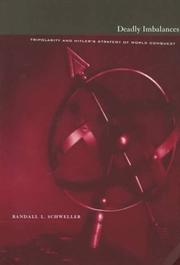
ISBN: 0231110731 0231110723 9780231110730 9780231110723 Year: 1997 Publisher: New York Chichester, UK Columbia University Press
Abstract | Keywords | Export | Availability | Bookmark
 Loading...
Loading...Choose an application
- Reference Manager
- EndNote
- RefWorks (Direct export to RefWorks)
Scholars frequently portray World War II as an epic morality play driven by a villain (Hitler) and a sinner (Chamberlain). This book offers a fresh approach, combining both the attributes of states and the structure of the international system to explain the origins and causes of World War II. Central to the analysis is the argument that the structure of the international system was tripolar - with Germany, the Soviet Union and the United States as the three central powers - and not multipolar and that this needs to be considered in any examination of the antecedent causes and crucial events of the war. Recognizing that both systems and human agents make history, the author presents an amended balance-of-power theory, a balance-of-interests theory - that distinguishes great powers by their relative material strength and the value they place on the status quo. This systems framework is used to examine and explain the dynamics of tripolar systems; how states respond to threats and opportunities; Hitler's strategy of global dominion; and the foreign policy strategies of the other major powers before and during the war.
Antithesis --- Balance des pouvoirs --- Balance of power --- Coexistence --- Contrariety --- Coëxistence pacifique --- Foreign affairs --- Foreign policy --- Interdependence of nations --- International relations --- Internationale betrekkingen --- Machtsevenwicht --- Opposites --- Ordre mondial --- Peaceful coexistence --- Polariteit --- Polarity --- Polarité --- Power [Balance of ] --- Power politics --- Puissances [Équilibre des ] --- Relations internationales --- Vreedzame coëxistentie --- Wereldorde --- World order --- Équilibre des pouvoirs --- Équilibre des puissances --- Équilibre international --- History as a science --- World history --- anno 1900-1999 --- 812 Ideologie --- 813 Methodologie --- 820 Internationale Betrekkingen --- 822.6 Militaire Bondgenootschappen --- 823 Diplomatie --- 826 Imperialisme, Kolonialisme --- 827 Geopolitiek --- 855.1 Strategie --- 855 Oorlogsvoering --- 882.4 Noord-Amerika --- 883.2 Oost-Azië --- 884.1 Oost-Europa --- 884.2 Noord-Europa --- 884.3 Zuid-Europa --- 884.4 West-Europa --- Dialectic --- Opposition, Theory of --- Foreign relations --- Global governance --- International affairs --- National security --- Sovereignty --- World politics --- Power, Balance of --- Political realism --- Polarity.
| Listing 1 - 10 of 14 | << page >> |
Sort by
|

 Search
Search Feedback
Feedback About
About Help
Help News
News